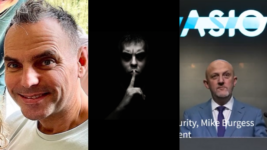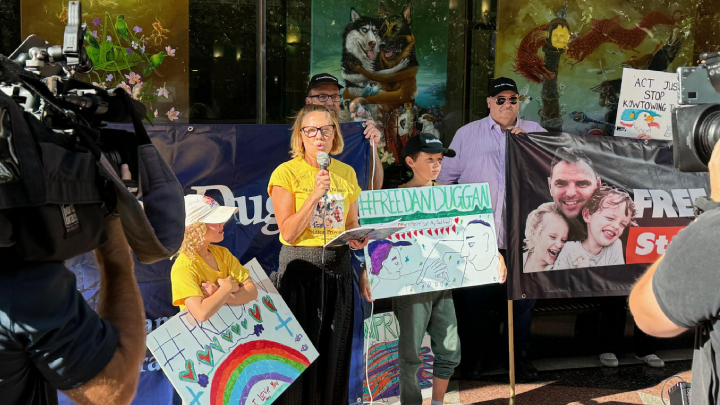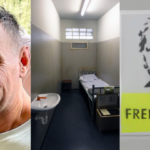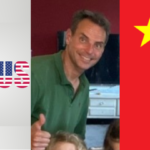Cold War Implications of Dan Duggan Extradition Heat Up as Security State Closes Ranks

The extradition case involving Australian citizen Dan Duggan, which has seen the father-of-six remanded in prolonged isolation on request of the US for over 500 days now, has always maintained an air of legitimacy about it, despite its stark anomalies, until the “skullduggery” of the last week.
The AFP arrested the former US marine pilot on 21 October 2022, over allegations he’d broken US arms control law, via the illegal exporting of defence services, when training Chinese nationals to land fighter jets on aircraft carriers at a top South African flying school circa 2010.
Yet, a complaint claiming ASIO had illegally lured Dan back to Australia with the false promise of an aviation card was put to the Inspector General of Intelligence and Security by Duggan himself. It raised 10 points of contention, and the ASIO regulator decided to investigate the matter last March.
Prior to the latest 6 March court hearing, however, ASIO director general Mike Burgess claimed in a Guardian interview, that an IGIS report into the Duggan complaint had been released and it did not fault his agency’s handling of the matter and these findings also happen to be classified.
And the ASIO boss’ announcement blind sighted Duggan’s legal defence team and the #FreeDanDuggan campaign, which after tempering its pronouncements in the past, has now shifted its position to clearly stating that Australian authorities are engaging in new rule “cloak and dagger” tactics.
A veil of secrecy
Duggan served in the US marines for 13 years, ending in 2002. He later married local woman Saffrine Duggan and became an Australian citizen.
At the time Dan was told he’d been granted an ASIO clearance for an ASIC card in mid-2022, he’d been managing an aviation consultancy in the Chinese city of Qingdao, and it was suggested he return to Australia to claim the highly sought-after card.
The Aviation Security Identification Card would allow Duggan to work locally in Australian airports. But on return to this country, the ASIC card was no longer on offer, and AFP officers then approached and arrested Duggan in his hometown of Orange in regional NSW.
Since then, Duggan has been remanded in NSW maximum security facilities, has been held in solitary confinement, has, at times, been classed as a high security inmate, has not been charged with anything, and wasn’t told of the allegations against him for more than 60 days, all on US request.
“People do have a legal right to make complaints to the inspector general about what they think we’ve done,” Burgess told the Guardian. And the ASIO boss added that the allegations about his organisation’s handling of the case, had resulted in his agents being cleared of any wrongdoing.

A key omission
However, #FreeDanDuggan stated in a 4 March press release that “Burgess also failed to reveal that Dan’s legal team is in receipt of a letter from the IGIS that states it had found an ‘impropriety’ in ASIO’s behaviour”, adding that these findings, however, remain classified.
“The letter to Dan’s legal team stated: ‘Additionally, to the elements of Mr Duggan’s complaint as such, I found that that one activity did transcend the bounds of propriety in one respect, full details of which are set out in the classified report,’” the statement continued.
Another stark aspect to the recent development raised is that hearings regarding Duggan have been periodically occurring over the last year, yet the letter Duggan’s team received from the IGIS was dated 16 August 2023, and Burgess only came to reveal this information a week ago.
Duggan’s lawyers, politicians and other experts have raised the point that the Duggan case has emerged at a time when cold war tensions are mounting in the Indo Pacific in relation to a campaign for a US-led war on China, and this case relates to the Chinaphobic campaign being run in the press.
Former Australian foreign minister Bob Carr raised the point at an anti-AUKUS meeting 12 months ago, stating the public is being prepped for war with China, and he’d noticed a shift in the local media to “a China panic” in 2017: the year the Trump administration issued the Duggan indictment.
A list of travesties
But this latest freezing out of the defence legal team from the determinations made in relation to a key aspect of its case that it instigated, is hardly the first time during the Duggan extradition proceedings have involved developments that do reflect a departure from transparency and the rule of law.
Following Duggan’s initial incarceration in October 2022, attorney general Mark Dreyfus signed off on extradition that December. However, the chief lawmaker failed to announce whether the charges the US seeks to prosecute him over are reflected in local law as required under the treaty.
The 1976 Treaty on Extradition between Australia and the United States neither allows extradition over political crimes, and Duggan’s lawyers contend, as do Julian Assange’s lawyers in relation to his extradition case in the UK, that the charges being faced are, if nothing else, political in nature.
And in another move that had Duggan’s lawyers crying foul over loss of Australian sovereignty, the AFP issued a seizure order to prevent the sale of a southern NSW property, with a half-built family home upon it, which is owned by Dan’s wife, Saffrine.
Indeed, the court determined to continue the seizure of the property, despite federal police admitting it had mistakenly identified Dan as a director of the company that owns it, which was taken to have “peripheral evidential relevance”, and that source of funding for legal fees has gone.
Canberra heightens its campaign
Duggan appeared in Sydney’s Downing Centre Court on 6 March for another extradition hearing. The case was then adjourned until April.
The Australian’s criminal defence lawyers are continuing to seek Defence papers in relation to the case. And a decision on extradition is not expected until at least May.
“The continued cloak and dagger skulduggery has no place in a free country like Australia, where we pride ourselves on transparent government and the right to a fair hearing in court,” said Saffrine Duggan, in relation to the Burgess announcement.
“What happened to the concept fair go, when ASIO is allowed to use the media to whitewash its involvement in the case behind a veil of secrecy and classified reports.”







